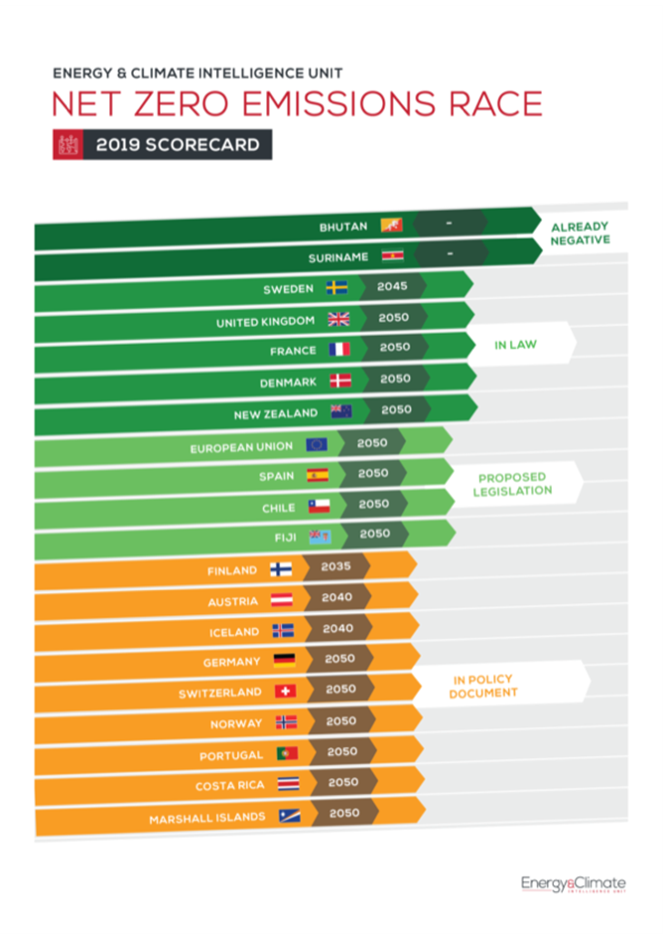Simply put a Net-Zero Pledge is a commitment made at a national level or at an organisational or personal level, to reduce and balance Carbon emissions by 2050 or earlier. Most people will be familiar with the breakthrough Paris Agreement which was and is a legally binding international treaty packed full of commitments on climate change. It was adopted by 196 Parties at COP 21 in Paris, on 12 December 2015 and entered into force on 4 November 2016. Since then, there has been a gathering of momentum for Net-Zero commitments and pledges globally and in June 2019, the UK became the first major economy to enshrine #netzero by 2050 in law.

However, it’s not just countries that are making Net-Zero commitments & pledges — regions, cities, companies, sports teams and whole industries are also getting in on the Net-Zero act and there are numerous campaigns and Net-Zero commitment groups that have sprung up to support, encourage and build momentum.
At a global leadership level, the UN has its Race To Zero campaign to rally leadership and garner support from businesses, cities, investors and individuals. It looks for commitments for a healthy, resilient, zero-carbon recovery that prevents future threats, creates decent jobs, and unlocks inclusive, sustainable growth. All members sign up to the same overarching goal: achieving Net-Zero emissions by 2050 at the very latest.
At a global business level then Amazon and other multinationals seem to be leading the way with “The Climate Pledge” https://www.theclimatepledge.com/us/en.html
The Climate Pledge is a cross-sector community of companies, organizations, individuals, and partners, working together to crack the climate crisis and solve the challenges of decarbonizing our economy. Bringing together those that are prepared to run the furthest and fastest, The Climate Pledge calls on signatories to reach net zero-carbon emissions by 2040—10 years ahead of the Paris Agreement. Amazon co-founded the Climate Pledge with Global Optimism in 2019, and became the first signatory of the pledge
There is a definite trickle-down effect occurring from Countries, to Cities, to Businesses and Individuals and as momentum is building, then it’s increasingly common to see Net-Zero Pledges now being made at every level. However many pledges do not stand up to scrutiny and can often be accused as simply cosmetic or window dressing as they lack real substance. For a commitment or pledge to be truly meaningful, then they need to have clear and measurable targets and be backed up by tangible action.
At a national level, this is done through nationally determined contributions (NDCs), where countries communicate actions they will take to reduce their Greenhouse Gas emissions in order to reach the goals of the Paris Agreement. At a corporate level and using the Climate Pledge as an example then Signatories have to meet three binding commitments:
Measure and report greenhouse gas emissions on a regular basis – regular, transparent reporting is the principle that underpins and informs how each signatory tackles their carbon elimination strategies and opens the gateway to innovation.
Implement decarbonisation strategies in line with the Paris Agreement through real business change and innovations, including efficiency improvements, renewable energy, materials reductions, and other carbon emission elimination strategies.
Must take actions to neutralize any remaining emissions with additional, quantifiable, real, permanent, and socially-beneficial offsets to achieve Net-Zero annual carbon emissions by 2040.
Having this style of clear commitment that has been made in the Public domain shows intent and provides a framework for any organisation to be held to account by their stakeholders. In a UK Public Sector and Education Context, however, then there are no common targets or standards currently in place. The Government has set its own Net-Zero targets of; Net-Zero by 2050 with a 68% reduction in greenhouse gas emissions by 2030 (compared to 1990 levels) and a commitment to reducing emissions by the fastest rate of any major economy, but for the wider public and higher education sectors in England, the government has so far only introduced a voluntary target of reducing greenhouse gas emissions by 30% by 2020/21, compared to a 2009/10 baseline.
So, in the absence of any real or clear targets for the Education Sector, then Universities are leading the way as might be expected. Therefore, for any School, Academy, or Trust that is looking for guidance or steering on NetZero Commitments or simply inspiration, then there are a number of good University examples to consider, but you have to hunt a little as they come under a number of different banners – Climate Emergency Statements, Strategic Sustainability Plans, Carbon Reduction Plan and Net Zero Pledges for example:
https://www.lse.ac.uk/2030/sustainability-strategic-plan
https://www.ncl.ac.uk/sustainable-campus/themes/carbon/
https://www.bath.ac.uk/topics/climate-change-and-the-university-of-bath/
At enFrame we are also working hard with our Net-Zero Beacon Academy Trusts to develop a set of Net-Zero resources including a Pledge Template and guidance for all schools to use and hope to make this available after Easter. If your School or Trust has already made Net-Zero commitments and Pledges and you are happy to share these, then we would love to hear from you or if you would like to find out more about our Net-Zero Beacon Trusts and resources then please contact us here.
